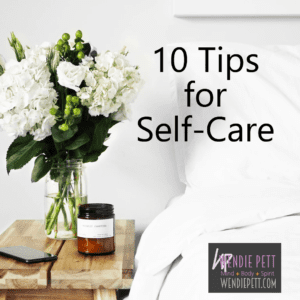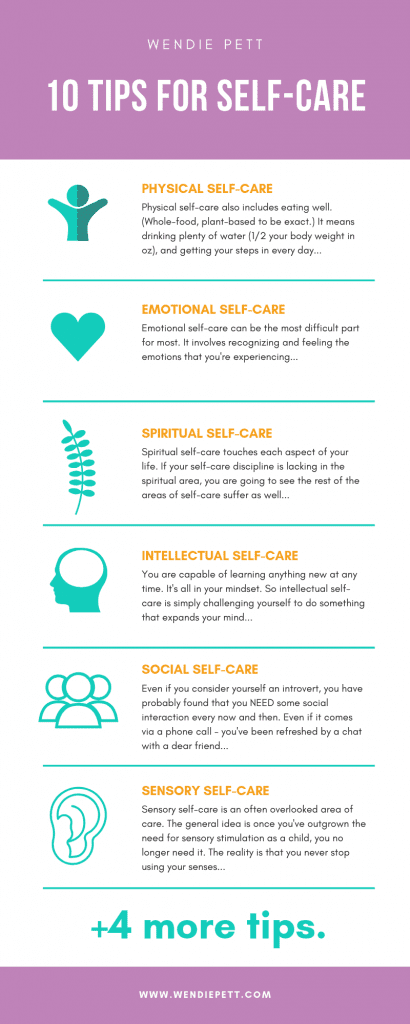Summer is such a beautiful time, easy to let all of your work come to halt – don’t let that happen to you this summer; follow my 10 tips for self-care and you’ll keep from burning out this season.
Self-care is a huge buzz-word in our culture now with good reason. You can’t serve from an empty cup. So cliche, but there is so much truth in it.
If you haven’t taken the time to care for yourself, you can’t care for others. The flight attendants remind me of that every time I take a trip.
So what is practical self-care?
Let’s break self-care down into its main categories:
- Physical
- Emotional
- Spiritual
- Intellectual
- Social
- Sensory
1. PHYSICAL
Physical self-care may seem pretty basic – exercise!
Well yes, but there’s more to it. Physical self-care also includes eating well. (Whole-food, plant-based to be exact.) It means drinking plenty of water (1/2 your body weight in oz), and getting your steps in every day. Physical self-care can even be a regular daily routine of face-washing, tooth-brushing, and essential oils. The aspect of self-care in the physical sense is anything you do to benefit your body.
2. EMOTIONAL
Emotional self-care can be the most difficult part for most. It involves recognizing and feeling the emotions that you’re experiencing. Forms of emotional self-care would be journaling, praying (because yes – prayer plays into our emotions and can be INCREDIBLY stress-reducing), worshiping, meditating, or even expressing your emotions through a hobby or an art. Recognizing your emotions and processing why you’re feeling what you’re feeling is key to living a healthy life.
3. SPIRITUAL
Spiritual self-care touches each aspect of your life. If your self-care discipline is lacking in the spiritual area, you are going to see the rest of the areas of self-care suffer as well. The key to spiritual self-care is recognizing your need for Jesus. Coming to terms with how desperate your soul is for a Savior and letting Him wash over every part of you. Spiritual self-care is resting in the peace and freedom that Jesus offered and created for us at the Cross. How is this attained? Time in Scripture, prayer, meditating on His word, it could be working with your church to minister to others (fulfilling the Great Commission), it could be doing anything that you feel He has gifted you in. (1 Corinthians 12)
4. INTELLECTUAL
I know you’ve heard the term, “can’t teach an old dog new tricks.” Which sometimes seems to be true, but really – you are capable of learning anything new at any time. It’s all in your mindset. So intellectual self-care is simply challenging yourself to do something that expands your mind. Learning a new skill or hobby, or reading a book every day. Something that gets the brain working and helps you to see life a little differently. You could do some research on a different culture or learn a new language. You could even watch a documentary, this is one of my favorites!
5. SOCIAL
Even if you consider yourself an introvert, you have probably found that you NEED some social interaction every now and then. Even if it comes via a phone call – you’ve been refreshed by a chat with a dear friend. A phone call, as I mentioned is a form of social self-care. It could even be a walk around the mall with a friend, a class you take together, a visit to a zoo or museum with friends, a movie night in with the girls (maybe with some “nice”-cream). Making sure that you’re interacting with people on a regular basis, even if you are an introvert, is a healthy way to benefit your social needs.
6. SENSORY
Sensory self-care is an often overlooked area of care. The general idea is once you’ve outgrown the need for sensory stimulation as a child, you no longer need it. The reality is that you never stop using your senses. Without stimulating your senses, life is boring. Try diffusing your favorite oils, or lighting your favorite candle. Go running in the sand, turn on your most favorite music, do your workout outside. Try a new fruit or vegetable, or a new plant-based recipe. There are so many options when it comes to sensory self-care.
Now what?
That’s all well and good, but it’s pretty unrealistic to get all of that in one day, right?
Wrong. It’s totally doable to get something from each category in each day. It has to do with your routine and your mindset (again).
7. Try picking one thing from each category to create a routine with. This routine won’t happen overnight, but day by day, the more you work at it, the better it will become. You could mix things in a morning, afternoon, and evening routine and spread things out in a way that is helpful for you.
8. Don’t think of self-care as something to check off a list. I know that sounds a little backwards after I shared to start a routine with each part. But if you begin thinking of self-care as something to check off a list it will be easier to ignore. Self-care should be a daily practice, not a to-do list.
9. Start small. Think of things you’re already doing, and consider those part of self-care. What do you do every day for yourself that you love? Do you love brushing your teeth or taking a shower? Then those things count as self-care. Do you feel like you’ve cared for yourself after you eat a huge salad? Then that is self-care. Are you refreshed by just turning on music during the day? That is how you are showing yourself care. Count those regular, “mundane” things as your self-care!
10. Don’t let it overwhelm you. It can seem like a lot. Especially when you look at it in list form like this. But in reality, these things are so simple. And again, if you don’t take care of yourself, you CAN’T take care of anyone else.
If you need a place to begin, sign up for my FREE 7-day meal and exercise plan. It’s the perfect place to start!





